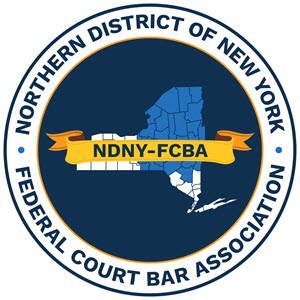By Clerk of the Court John Domurad
One of the little-known but perhaps most critical duties of the Clerk’s Office is to collect, administer and disburse restitution payments to victims of criminal conduct. This is no small task. Over the past three and a half years, the Northern District of New York has disbursed more than $8,471,000 to more than 13,221 victims.
Unfortunately, the sad realization about restitution is that not everyone can be made whole. When a defendant is ordered to pay restitution, current statutory guidance provides this restitution must be paid within 20 years from the date of the judgment or release from prison, whichever is longer. After the expiration of this period, the requirement to pay restitution is extinguished. Not infrequently, defendants lack the means to satisfy this requirement within the allotted timeframe and the judgment goes unfulfilled.
Another common reason that victims are not made whole is the lack of a current address or contact information for the named victim. Although Judiciary policy does not require the Clerk to research victim information following a returned payment, we take a different position on this matter and make every reasonable effort to find the victim. Specifically, we try to obtain email addresses from the Victim Witness Unit in the U.S. Attorney’s Office, in order to contact the victim to update their mailing address. We search online databases and other resources in an attempt to send letters to the victims explaining the importance of maintaining their current address with our office. In at least one instance, when we reached a victim, they indicated they received the check but were “unbanked” and lacked the ability to negotiate the check. In this instance, we worked with the victim to establish a wire transfer protocol so they could receive the funding.
Despite these efforts, there are circumstances where we cannot locate the victim. In such a case, by regulation, after one year, these funds are eligible to be transferred to an unclaimed funds account maintained by the U.S. Treasury. One avenue we are implementing to avoid this pitfall is to increase victims’ awareness of the option of having their funds directly deposited to their accounts via an electronic transfer of funds. Because this medium of transfer does not typically change when a victim relocates, it has proven incredibly useful in ensuring victims continue to receive their restitution payments.
One question that frequently arises is whether a defendant may pay restitution in advance of their plea or sentencing. This is allowed but requires an order from the presiding judicial officer. Regardless of when restitution funds are received, they cannot be disbursed to victims before judgment is entered on the docket. Furthermore, the Court is required to hold funds at least 30 days, and we choose to hold them for additional time upon the filing of an appeal.
Here in the Northern District, we view the collection, administration and disbursement of restitution as one of our core responsibilities. We also recognize it is a topic that can be somewhat confusing if you do not typically practice in this arena. Accordingly, we have assembled a list of frequently asked restitution questions, which is available on our external website at https://www.nynd.uscourts.gov/restitution-faqs. And, of course, please feel free to give me or Chief Deputy Dan McAllister a call with any questions. We will always be glad to assist you.

